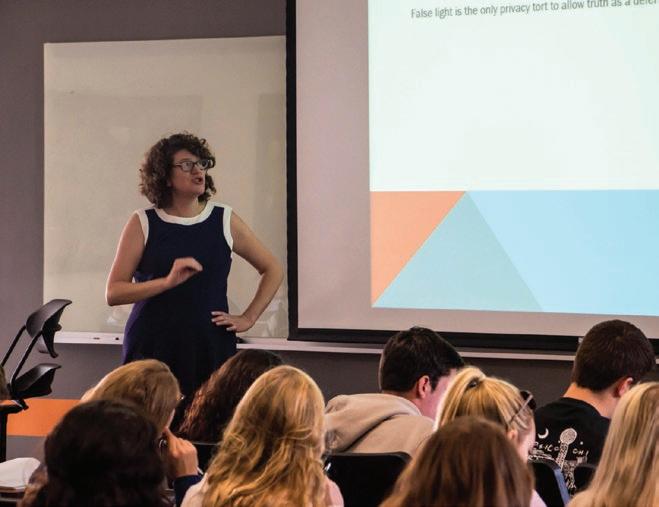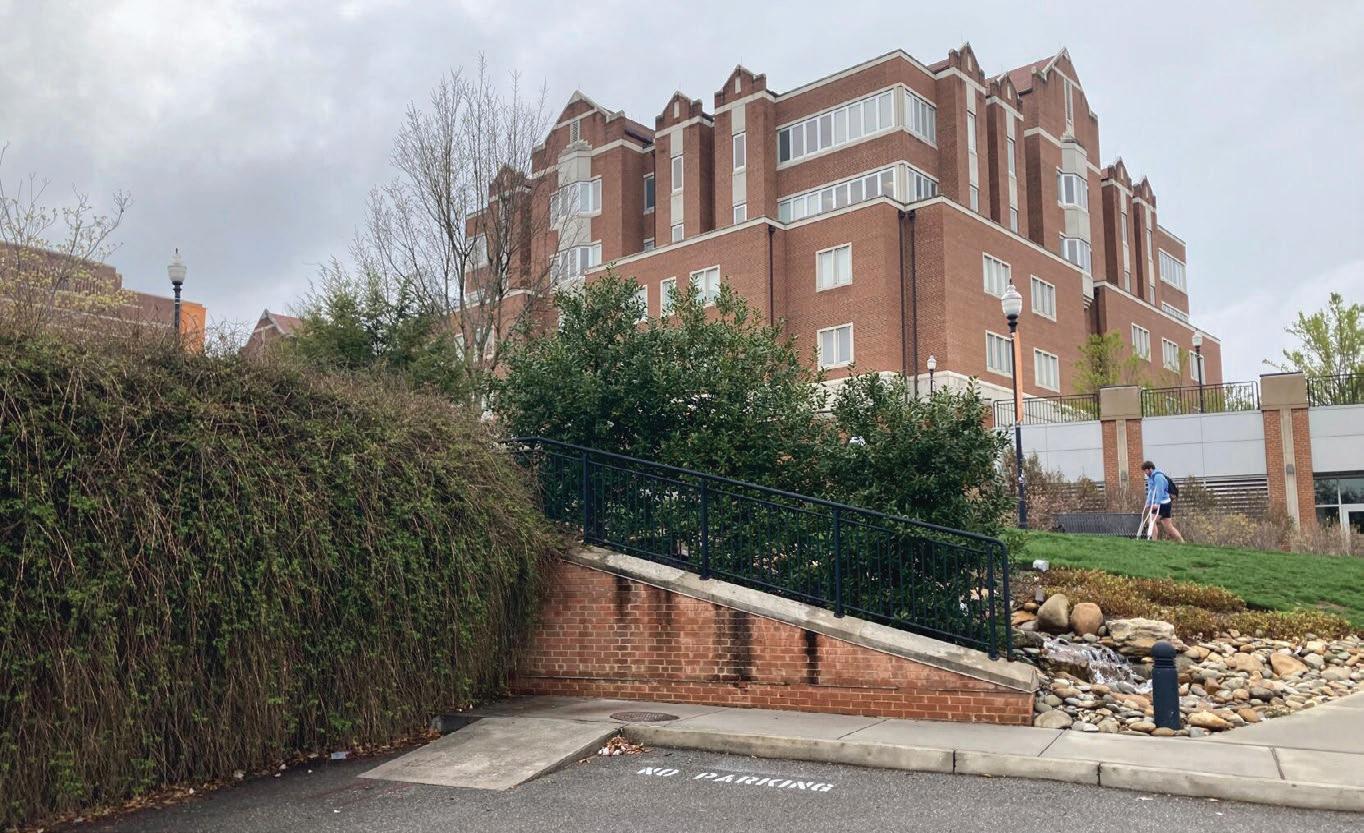










Volume 143, Issue 9 Wednesday, March 29, 2023 @utkdailybeacon | | | The Daily Beacon Meet the campaigns SGA Elections 2023 Commit and The Volunteer’s Union go head-to-head to see who can connect most with student voters and get the chance to control student government next year.
DAILY BEACON STAFF AND POLICY INFORMATION


EDITORIAL
EDITOR-IN-CHIEF: Daniel Dassow
MANAGING EDITOR: Abby Ann Ramsey
COPY CHIEF: Olivia Hayes
NEWS EDITOR: Autumn Hall
ARTS & CULTURE EDITOR: Emma Co�ey
SPORTS EDITOR: Andrew Peters

ASST. SPORTS EDITOR: Eric Woods

PHOTO EDITOR: Ericksen Gomez-Villeda
DIGITAL PRODUCER: Lauren Ward
DESIGN EDITOR: Bella Hughes
PAGE DESIGNERS: Emma Fingeret, Rhylee Gross, Julia Paulman, Chloe Black
SOCIAL MEDIA MANAGER: Jackie Dremel
ADVERTISING/PRODUCTION
ADVERTISING MANAGER: Cullen Askew
ADVERTISING REPRESENTATIVES: Shelby Coppock, Jacob Stromatt
ADVERTISING PRODUCTION ARTISTS: Everrett Hurst, Jean Mendoza
CONTACTS
TO REPORT A NEWS ITEM OR SUBMIT A PRESS RELEASE, please email editorinchief@utdailybeacon.com or call (865) 974-2348

TO PLACE AN AD, please email admanager@utk.edu.
LETTERS POLICY: Letters to the Editor must be exclusive to The Daily Beacon and cannot have been submitted to or published by other media. Letters should not exceed 400 words and can be edited or shortened for space. Letters can also be edited for grammar and typographical errors, and Letters that contain excessive grammatical errors can be rejected for this reason. Anonymous Letters will not be published. Authors should include their full name, mailing address, city of residence, phone number and e-mail address for verification purposes. Letters submitted without this information will not be published. The preferred method to submit a Letter to the Editor is to email the Editor-in-Chief.
CORRECTIONS POLICY:It is the Daily Beacon’s policy to quickly correct any factual errors and clarify any potentially misleading information. Errors brought to our attention by readers or sta� members will be corrected and printed on page two of our publication. To report an error please send as much information as possible about where and when the error occurred to managingeditor@utdailybeacon.com, or call our newsroom at (865) 974-5206.
The Daily Beacon is published by students at The University of Tennessee on Monday and Thursday during the fall and spring semesters. The o�ces are located at 1345 Circle Park Drive, 11 Communications Building, Knoxville, TN 37996-0314. The newspaper is free on campus and is available via mail subscription for $200/ year or $100/semester. It is also available online at: www.utdailybeacon.com
Letter from the Sports Editor: The Garden is still Eden
ANDREW PETERS Sports Editor
One of my earliest basketball memories was the day Carmelo Anthony got traded to the Knicks.
I was home sick from school one February day in fifth grade. Watching ESPN and seeing the report of the trade, I remember thinking to myself how big of a deal it was. I wasn’t a Denver Nuggets (Anthony’s former team) or a New York Knicks fan, but I could just tell how monumental the trade was. It was the first blockbuster trade that had happened since I started watching the NBA a few years prior.
For the next few years, I watched Anthony put on some great performances at Madison Square Garden. His 62 points against the Bobcats in 2014 still stands as arguably the best performance ever inside the Garden.
Basketball fans from all generations are taught from a young age how special Madison Square Garden is and each generation has its own player that keeps the tradition alive. In the 60s and 70s, it was Walt Fraizer and Willis Reed. In the 80s and 90s it was Bernard King and Patrick Ewing. For my generation, it was Melo.
Early on in my basketball-watching years, I couldn’t wait for the day I finally got to see the Garden in person. At the time, I probably was still dreaming of playing there, but a few years later I realized I probably had a better chance of writing about the people who were actually good enough
to play in the Garden.
My first time seeing MSG was in 2021 when I visited New York for the first time. Flying into the Newark, New Jersey, airport and taking a train into the city, one of the first things you see when you emerge from Penn Station is the goliath of a building that is Madison Square Garden.
While it sits below all the skyscrapers around it, the Garden’s presence on Eighth Avenue is undeniable. I was in awe seeing the building that claimed so much history for the first time.
Fast forward to February 2023. As the college basketball regular season was winding down, more and more bracket projections had Tennessee in the East Region with a chance to play in Madison Square Garden if it could make the Sweet 16. I was admittedly eager for the Vols to make the Sweet 16 so I could have a chance to finally make my way to the Garden.
After a shaky performance against Louisiana and a convincing win over Duke, Tennessee was on its way to Madison Square Garden and so was I.

The days leading up to my departure for New York, all I could really think about was finally getting to cover a game at the Garden — apologies to my professors. I got to New York Thursday morning and was counting down the hours until I could go into the arena.
A quick stop for pizza at Prince Street and a cup of coffee, and I was on my way to the legendary venue. Approaching the arena, I was greeted by the aroma of urine and marijuana — two of the staple smells of New York City. I was there about four hours before the game, but I was too eager to not get there early.
The game before Tennessee vs. Florida At-
lantic was Kansas State vs. Michigan State and it turned out to be arguably the game of the tournament. Kansas State won in overtime behind 20 points and a tournament-record 19 assists from Harlem native Markquis Nowell. The hometown kid with the performance of a lifetime at MSG? It doesn’t get much better than that.
Unfortunately for basketball fans inside the Garden, the game after was one of the uglier ones of the tournament. Florida Atlantic won the slug match over the Vols to end Tennessee’s season. While I was hoping to cover another game at Madison Square Garden, it was still such a special experience doing interviews in the locker room and grinding out a few stories until about 3 a.m.
So thank you to the Beacon for giving me the opportunity to live out my dream and cover basketball — and thank you to Tennessee for making it to Madison Square Garden, giving me an opportunity to cover a game in one of the most legendary sports venues in the world.
Now let’s get ready for an awesome Final Four with no blue bloods and a couple of gritty and determined teams. It’s going to be one for the ages even if the basketball purists swear that TV ratings will be at an all-time low.
My prediction? I think Florida Atlantic is going to beat San Diego State to become the lowest seed to ever reach the national championship. Unfortunately for the Owls, they are going to meet a tough UConn team, which will defeat Miami in the Final Four. The Huskies make the most sense on paper, but as the season has taught us, anything can happen.
The Daily Beacon • Wednesday, March 29, 2023 2
LETTER FROM THE EDITOR
Jahmai Mashack (15) scans the floor for an open teammate during a NCAA tournament game against the Florida Atlantic University Owls at Madison Square Garden, New York, March 23, 2023. Cole Moore / Contributor
SGA Senate passes bill promoting exclusively female workout space in TRECS facility
action could potentially get the ball rolling for other schools in the conference to make the same adjustments.

On March 21, the Student Government Association’s First-Year Leadership Council presented its “Female Specific Workout Space” bill for the first time at the Undergraduate Student Senate meeting held at the Student Union. It was immediately voted on and passed in the single session.
The bill proposes exactly what it sounds like: a designated space at UT’s TRECS facility exclusively for female-identifying students to workout in. FYLC members Nicolette Abate, Jackson Ford, Kiley Shumpert, Caroline Choate and Gracie Steely opened their presentation by providing definitions of the words “female” and “workout space.”
In context of the bill, “female” refers to individuals who identify or express themselves as female, whereas “workout space” is considered an area that provides the same equipment and machine availability as seen in the general workout space in the TRECS. The goal of this change is not to require women to use the space, but to provide a more empowering and comfortable workout space for femaleidentifying individuals.
The need for the bill stems from concerns
from female-identifying students about the atmosphere of TRECS. FYLC conducted a survey asking for thoughts and feedback regarding experiences had at the on-campus recreation center, with many replies mentioning that the space is “judgmental” and they would rather workout at nearby facilities like Club 4 or Planet Fitness due to the fact that those establishments do offer a women’s only section.


“This isn’t just like my friends not wanting to go to the gym, this is like people I barely even know telling me that it’s an issue, so I was like ‘oh maybe this is something that everyone wants,’” Shumpert said.

The bill is now passed to administration for review. If it becomes a reality, UT would be the first school in the SEC to have a space available for strictly female gym attendees. In turn, this

“In writing legislation in FYLC, they told us that one of the biggest things, one of the easiest ways to get things passed, was if it could put UT ahead of other SEC schools. Everyone is looking at the competition. They do have a tendency to follow each other’s leads,” Shumpert said.
The bottom floor of the TRECS experienced some flooding over winter break, with classrooms and equipment being damaged, and the bill proposes renovating these impaired rooms for the female-only space. Based on the survey that the group conducted, it’s clear that the overwhelming majority of people utilizing those spaces prior to the damages were female.
“We were thinking, like, they’ve already shown that the gym can function without those so why not go ahead and use them. And also, 96% of the people that use the rooms for classes and stuff are female already. We’re not really taking that away from them,” Abate said.
While the bill focuses on enhancing women’s experience at the TRECS, the newly added space would also clear congestion found on the main floor of the gym and allow a more enjoyable experience for all TRECS visitors.
Wednesday, March 29, 2023 • The Daily Beacon 3
NEWS MON-FRI DAYTIME HOURS. SOME NIGHTS AND WEEKENDS. VALID DRIVER’S LICENSE. 865-522-3353 | KNOXVILLETN.GOV/RECREATION | PHATCHER@KNOXVILLETN.GOV
UT will be the first school in the SEC to introduce a female-specific workout space. File / The Daily Beacon
JOIN OUR TEAM
REAGAN DESOTO Staff Writer
‘The heart of our university’
At the Graduate Student Senate’s annual awards ceremony, administrators and faculty celebrated the work of graduate students across campus, from teaching to research and service.
 ABBIE SMITH Staff Writer
ABBIE SMITH Staff Writer
To kick off Graduate and Professional Student Appreciation Week kicks at the University of Tennessee, the Graduate Student Senate (GSS) held an awards banquet in the Student Union in order to honor graduate students, professors, mentors and organizations who demonstrated excellence in their field.
The night began with dinner and music, a violin and cello duet performed by School of Music Graduate Students Mei Lia White and Hannah Paulus respectively. The perimeter of the room was lined with art displays provided by the School of Art, with all featured artists being graduate students themselves. These art displays were presented through film, photography, sculpture, drawing and other methods of creation.
Leighton Chappell, the vice president of the Graduate Student Senate, was the emcee for the night. He explained the purpose of the banquet in his opening remarks before introducing UT Chancellor Donde Plowman.

“This year, we take different forms to accomplish the goal of recognizing our outstanding graduate and professional students, as well as those faculty staff organizations that support them in their pursuit of higher education,” Chappell said, gesturing to the musicians on his left and the art around the room.
“We are a university on the rise,” Plowman said. “You know, all universities are universities. But graduate students are the heart of our university. I think of students in the classroom doing research engagement, I think of law school, our professional clinics and social work. All of this is possible because of you.”
The theme continued when George T. Fields, the president of GSS, took the stage to wrap up the opening remarks. He recognized those who attended the banquet, thanking them, but focusing on the graduate students. Fields listed award recipients, students, guests, nominators, administrators, senators of GSS, musicians and artists as the people who made the night possible.
“What we have in this room is a community of people who recognize that graduate and professional students give a lot to this university and deserve a lot in return: support, to maintain their hard schedules, guidance and direction in completing their theses and dissertations, and trying to make this world better and developing their
professional and academic personas,” Fields said. “I can’t think of a better way to shine a spotlight on those around us who deserve to have all eyes on them.”
The first award was presented by Deborah Crawford, the vice chancellor for research at UT. The Excellence in Graduate Research award was awarded to three nominees: Sarah Narvaiz, studying Theory & Practice in Teacher Education, Charles “Boomer” Russell, studying Biochemistry & Cellular and Molecular Biology and Yi Yang, studying Material Sciences and Engineering.
“You are graduate students representing the future of our great university and our great nation. Together, you’re working to solve some of the most challenging problems in our lives. We are so very proud of your commitment to create and apply knowledge that truly will save lives and lead to prosperous, secure and sustainable futures for all,” Crawford said.
28 students were nominated for this award, though it was only granted to Narvaiz, Russell and Yang. Of these three, Yang received the 2023 Graduate Researcher of the Year.
The next award was titled “Excellence in Graduate Teaching.” Ferlin McGaskey, director of professional development, teaching and learning innovation presented the award.
“The most difficult role [graduate students] have is that of a graduate teaching assistant. It is a crucial and vital role that enables our institution to meet its goals and objectives in all areas for our students, our state, and our world,” McGaskey said.
24 students were nominated and the three recipients were as follows: Nicholas Grondin who is studying Geography, Nicole Lussier who is studying Ecology & Evolutionary Biology and the 2023 Graduate Teacher of the Year, Kristel Scoresby, who is studying Social Work.
There were nine nominations for the third award, which honored graduate and professional students who exemplified extraordinary leadership, participated in service learning or other community initiatives or provided service leadership to their academic discipline.
Mandie Beeler, the director of the Jones Center for Leadership and Service, presented this award to Chulin Chen who studies Industrial & Systems Engineering, Laura Horton who studies Comparative and Experimental Medicine and Jeana Partin who studies Educational Leadership and Policy Studies.
“Service connects people socially, emotionally, and spiritually. These students truly live out
the Volunteer spirit,” Beeler said before presenting Chen with the 2023 Graduate Student Leader of the Year award. “The commitment to serving others is a large part of what makes Rocky Top a great place to be and all of these student leaders represent us, but especially Chen.”
The Excellence in Community Engagement award was presented by Tyvi Small, vice chancellor for diversity and engagement, to Ashley Browning who studies Sociology, Morgan Fleming who studies Ecology & Evolutionary Biology and Megan Kleeschulte who studies Anthropology. Kleeschulte was alsonamed the 2023 Graduate Volunteer of the Year.
“UT is one of 28 universities nationally to be considered by the Carnegie Foundation as a community engaged with very high research activity. Out of the seven nominations for this award, GSS is recognizing three graduate students for their dedication to including and engaging the community in their outreach and research,” Small said.
Byron Hughes, assistant vice chancellor and dean of students, presented the fifth award, naming an Outstanding Graduate Student Organization. The three organizations that received this award were the Knoxville-Tennessee Environmental Soil and Stream Testing organization, Plant Sciences Graduate Student Association — who also received the 2023 Graduate Student Organization of the Year award — and the Women’s Organization of MBAs.
In his introduction of the groups, Hughes notes how crucial the graduate student experience is to a thriving campus life.
“The transforming power of an organization matters. It’s a space for collisions of people and purpose for people and purpose to intersect. Rocky Top is made better when people come together, centered around purpose, and commit to using their strengths and talents to move forward,” Hughes said.
The following three awards were given to those who teach, mentor and support graduate and professional students.
The first of these, the sixth total award, was presented by Elisabeth Schussler, the faculty senate president, to three professors who have shown outstanding commitment to teaching graduate and professional students. The honor was awarded to Kate McClernon-Chaffin of the
Social Work department, who was also named the 2023 Graduate Professor of the Year, Rajan Lamichhane of the Biochemistry & Cellular and Molecular Biology department and Louis Rocconi of the Educational Leadership and Policy Studies department.
The seventh award for Outstanding Graduate Research Mentor was awarded to three recipients by John Zomchick, senior vice chancellor and provost. These recipients were Sindu Jagadamma of the Biosystems Engineering and Soil Sciences department, Keerthi Krishnan of the Biochemistry & Cellular and Molecular Biology department and Joshua Rosenberg of the Theory & Practice in Teacher Education department. Jagadamma was named the 2023 Graduate Research Mentor of the Year.
Joshua Kenna of Theory & Practice in Teacher Education, Louis Presser of Sociology, and Morgan Tolbert of Veterinary Medicine were awarded the Outstanding Graduate Student Support award by Dixie L. Thompson, vice provost and dean of the graduate school. Presser was named the 2023 Graduate Director and Coordinator of the Year. As Presser’s name was announced, her attending children broke out into cheers of joy, becoming one of the highlights of the night.
The last award of the night was presented by Chappell. The honor of Graduate Student Senate Outstanding Contribution was awarded to Kassie Hollabaugh of Entomology & Plant Pathology, Karen Norwood of English and Breanna Schaeffer of Mechanical, Aerospace, and Biomedical Engineering. The recipient of 2023 Graduate Student Senator of the Year was Travel Awards Committee Chair Hollabaugh.
Thompson was welcomed back on stage for the closing remarks of this event.
“This night made me reflect on all the different ways that graduate education impacts our campus. The research that our students do, the teaching that they perform, the work they do in our communities through service and leadership, and the team around them that makes it all work,” Thompson said.
Thompson bid farewell to those who attended the banquet.
“Don’t forget: this is Graduate and Professional Student Appreciation Week. Say thanks to a graduate student this week! Have a good night,” Thompson said.
The Daily Beacon • Wednesday, March 29, 2023 4
NEWS
GSS President George T. Fields provides opening remarks at the GSS Awards Banquet. Courtesy of Graduate Student Senate
‘It was a madhouse’: Big Orange Tix to improve student ticketing following historically high demands
chance to obtain tickets.
University of Tennessee students are thrilled to see Vol sports teams performing well, but their excitement has often been met with the frustration of not being able to secure tickets to games.
For football and basketball in particular, the demand for tickets has surged alongside the success of teams. This increase in demand has made it difficult for students to get their hands on tickets to cheer on the Vols.

“During football season it was a madhouse,” senior business analytics major Delilah Davis said. “Everyone I knew had 20 alarms set to try and be the first ones on the Big Orange Tix site when tickets opened up.”
Big Orange Tix is an online portal for students to obtain discounted tickets online. Football tickets open for students to request approximately a week before a particular sporting event.
The most common misconception about the football ticketing process is that students need to be the first to request tickets in order to secure them. When an overload of students spam the website at once, it makes it a lot harder for students to easily enter the system.
“I remember waiting on the website for the clock to turn from 8:59 a.m. to 9 a.m.,” Davis said. “Once the request opened the site immediately crashed and everyone was freaking out thinking they weren’t going to get tickets. It was now becoming normal for the site to run slow, glitch or crash due to high traffic.”
The ticketing office urges students to read the ticketing information on their website to avoid confusion.

“There’s a request period and we even state
on our website that the time you request does not impact your chances of getting selected,” a spokesperson for Big Orange Tix said.
In actuality, the ticket distribution system is based on a few methods that impact a student’s ability to receive tickets.
Unless tickets are “On Demand,” meaning you buy them on the spot, there is no reason to request a ticket right when the portal opens. As long as the ticket is requested within the two-day window, students have just as good a
The loyalty points system is one of the biggest deciding factors in determining which students are selected to receive tickets. These points are usually earned by attending previous home football games. Points will not be gained from student sellout games, away games or any other UT sporting event.
Although not always the case, upperclassmen will tend to have priority over ticket allocation when there are games of high demand due to them generally having more loyalty points. While this system is currently in place, Big Orange Tix continues to strive towards the fairness of the ticket system.
“We are taking a look at improvements over the off season to see of ways that maybe we can look at students having other opportunities to earn loyalty points,” a spokesperson for Big Orange Tix said. “So it is something we’re exploring, but nothing is concrete at this time.”
Please remember that the request period and loyalty system mostly pertains to home football games. Basketball games and tournament games are typically “On Demand,” meaning they are first come, first serve.
With an influx of enrollment for the upcoming school year, UT is searching for new ways to improve the ticketing system so all students have a fair chance to cheer on the Vols.
The Daily Beacon • Wednesday, March 29, 2023 5 NEWS
CARSON JACKSON Staff Writer
Fans cheer on the Vols at the Alabama game in Neyland Stadium on Oct. 15, 2022. Moments after Tennessee won in a last-second field goal, fans stormed the field. Nolan Keesee / Contributor
‘Keeping Up With Karnicus’: 94th annual Carnicus to be held April 18









 REAGAN DESOTO Staff Writer
REAGAN DESOTO Staff Writer
The 94th annual Carnicus event will be held Tuesday, April 18 at 7 p.m. in the Student Union Auditorium. Hosted by the All Campus Events Committee, Carnicus is a choreographed comedy skit competition open to all organizations big and small at no cost. Greek life organizations make up the majority of performers but any sort of school registered club or affiliation is able to participate.

Beginning in 1929, Carnicus was the combination of the spring student circus and the student carnival, which used to be two separate events. The carnival would consist of vaudeville performances and skits put on by students, while the circus would feature clowns and comedians, as well as an organized dance.
Carnicus is a themed event and each year, performances must be crafted in relation to the given category. Over the last four years, performances have revolved around topics like “Fractured Fairytales,” “Let The Games Begin,” “The Final Rose” and “Y2Karnicus,” with this years theme being “Keeping Up with Karnicus,” an ode to reality television.
“I wanted to give people an opportunity to



















get creative with reality TV because there are so many different shows that people don’t really know about … I thought it was a good opportunity for people to widen their range because everyone watches TV and everyone has a different style of TV that they like to watch and I’m pretty sure everyone has seen at least one reality TV show,” Carnicus coordinator Gracie Hinton said.




The event allows participants to show off


an array of talents, whether that be music mixing, comedy, acting or dancing. Hinton enjoys the event because it’s more than just a comedy show. It’s an experience that encourages creativity in all sorts of ways.
“So many different people have different things that they are good at, like the director, the people writing the skits, are probably good at creating something for someone else … there are so many different realms. You might






not have to be good at performing something, but you might be good at writing it or putting the music together, so it gives so many different people the opportunity to do something they enjoy,” Hinton said.
Former Phi Mu Carnicus organizer Avery Witt appreciates the event for the way it brings people together and unites them under a common goal.
“I love Carnicus because it brought everyone out of their shell. In my memorable experience, I witnessed the event bringing women from two chapters, Phi Mu and ADPi, together to practice for weeks in a setting we otherwise might not have found ourselves in. We all played different roles through leading, acting, writing and were able to showcase seemingly hidden talents to one another … we laughed together, and to me, that is the pinnacle and recipe for friendship,” Witt said.
ACE is also responsible for a handful of other events around campus, including All Sing and several homecoming competitions. All events, including Carnicus, lead up to the ACE Cup which recognizes the most outstanding organization that has been competing throughout the various competitions.
Registration to participate in Carnicus is open until Sunday, March 26 with a mandatory meeting being held on April 3 in the Student Union in room 362B.








The Daily Beacon • Wednesday, March 29, 2023 6
• FEBRUARY 2023 • ARTS & CULTURE
THE DAILY BEACON WORSHIP GUIDE
The 94th annual Carnicus event will be held Tuesday, April 18th at 7:00 p.m. in the Student Union Auditorium. File/ The Daily Beacon
CBT’s ‘Men on Boats’ puts comedic, modern spin on 19th century expedition tale
MACY ROBERTS Staff Writer
What makes the Clarence Brown Lab Theatre’s performance of “Men on Boats” so enticing is how ironic the title of the play is. That is, despite what practically everyone would initially believe, there’s actually no men in the production.

Ten actresses play all male characters in “Men on Boats,” with some playing minor secondary characters in addition to their central characters. The main character, John Wesley Powell, is played by theatre student Jasmine Handy, whose amazing performance makes it seem as if the role was made for her.
I’ll admit that when I first heard about “Men on Boats” coming to the Clarence Brown Lab Theatre, I wasn’t that interested given that I don’t particularly enjoy men or boats. However, after reading the description of the play on the theatre’s website, my curiosity was piqued.
Although running approximately 100 minutes with no intermission, “Men on Boats” was consistently engaging and exciting to watch. The play is set in the 1800s and inspired by Civil War veteran John Wesley Powell’s actual travels across Western America as described in his travel log, but the journey is portrayed in a modern context.
For instance, characters frequently curse and use more modern slang, which sometimes feels a little overdone but maintains the play’s quippy feel. There’s also socio-political commentary on the reality behind American expansionism and colonialism, such as a comedic scene featuring a Ute tribe talking about how “stoked” they were that the American government allowed them to stay on
their own native land.

In addition to humor, there’s moments of genuine conflict and tension that give the production more depth and provide the audience something to look forward to besides more jokes.
The use of various props – from a jug of whiskey to stuffed snakes – and an unchanging set featuring a long wooden pathway is simple yet effective for each scene. The changing visuals on the projector behind the actresses provides beauty to the production, as different scenic mountain ranges change to signal the adventurers making progress in their journey.
There’s multiple scenes depicting travels across the water via prop boats, which does begin to feel a little repetitive as the play continues on, especially when characters are calling out the same lines. Although, a handful of dramatic scenes where boats capsize and passengers are thrown overboard makes the redundancy worthwhile.
Additionally, a large portion of scenes feature all ten cast members, which was initially confusing and a little overwhelming to follow at first. However, each character quickly establishes their own unique personality and relevance to the production that makes them easy to distinguish from each other.
Furthermore, members of the cast feed off of each other so well and band together to create collectively touching and humorous moments throughout the 100-minute runtime.
All in all, “Men on Boats” pleasantly surprised me. Its modern take on a 19th century adventure made it easy for audiences to follow along, and moments of drama and humor added so much character to what I originally thought would be a rather dull historical tale.
Weekly Crossword
Wednesday, March 29, 2023 • The Daily Beacon 7 This week’s crossword brought to you by Hibachi Factory This week’s crossword brought to you by Hibachi Factory Authentic Japanese Grilled Chicken, Steak, & Seafood 865 - 521- 6555 @ ORDER ONLINE NOW! Week of 3/27/23-4/2/23 ACROSS 1 PBS science series 5 Theater features 10 Not "fer" 14 Surrounded by 15 High-class tie 16 Trawler's trail 17 Edible root 18 Works on an anagram 20 Home in the Alps 22 Word before freeze or fry 23 Is no longer 24 Musical minim 26 Clairvoyant 28 "CSI" concerns 30 Cheerful tune 33 Frat letter 37 Sound amplifying device 39 Bicontinental landmass 41 Plato, to Socrates 68 Amount of hair 10 Beard on grain 38 Nine-day prayer 42 Animal fodder 69 Part of a pot 11 Cartoonist's 40 Natural 44 Song section collaborator response 45 Runner's goal DOWN 12 DIY furniture 43 Place in 46 Declining, in a 1 "Of course," brand shackles way slangily 13 Bitter end? 47 Mailroom supply 48 Make revisions 2 Nebraska native 19 Jungle dweller 49 "___ got it!" 50 Stalemate 3 Like some online 21 Cover 51 Juilliard major 55 ___-in-one videos completely 52 Sci-fi writer ___ 57 Lab vessel 4 First name in 25 Long rant Scott Card 59 Rodeo prop WWII infamy 27 Overjoy 53 Gridiron move 60 Iconic bridge in 5 Tailor, 29 ___ de corps 54 Cereal morsel California humorously 31 Ships' records 55 Like 63 Korea's 6 Suffix with legal 32 Genealogy centenarians continent 7 Campus life diagram 56 Easy gait 64 Fencing sword 8 Damaged, as a 33 Fulfilled, as a 58 Petri dish filler 65 Nitpick ligament promise 61 Cozy room 66 Monastery man 9 Tension-causing 34 Mystical glow 62 "___ the 67 Bruce of "The stimulus 35 Motorboat mover season..." Hateful Eight" 36 Like many roads
4/2/23
Week of 3/27/23 -
Copyright 2023 by The Puzzle Syndicate 1 2 3 4 5 6 7 8 9 10 11 12 13 14 15 16 17 18 19 20 21 22 23 24 25 26 27 28 29 30 31 32 33 34 35 36 37 38 39 40 41 42 43 44 45 46 47 48 49 50 51 52 53 54 55 56 57 58 59 60 61 62 63 64 65 66 67 68 69
The
by Margie E. Burke
Cast of Clarence Brown Theatre “Men on Boats” production. Photo by Ella Marston.
ARTS
Courtesy of Clarence Brown Theatre
& CULTURE
Strength in experience
ABBY ANN RAMSEY Managing Editor
In the spring of 2022, only one campaign ran for office in the SGA elections — a situation that led members of the student organization to consider how other students view the club and what the future would look like.
Now, however, two campaigns are vying for their candidates to take office in the 2023-24 academic year.
Members of Commit, one of the campaigns, see SGA taking steps toward becoming more well-known for serving students since last year’s single-campaign season but still see work to be done. They are running on the pillars of unify, inspire and reputation.
Commit’s top four includes Mark Hancock, a junior political science major running for president; Lindsey Campbell, a junior finance major running for vice president; Josie Drumwright, a junior political science major running for student services director; and Mary Hajdik, a junior majoring in finance and public administration running for executive treasurer.
The candidates running for the top four executive positions have all been deeply involved in SGA and say their campaign is based on forging connections and helping people get involved on campus.

A major hallmark of Commit, however, is its pillar of “reputation,” as the candidates want to work to rebuild campus’s perception of the student organization.
“Our organization has suffered,” Campbell said. “I don’t wanna say the word COVID, but I think COVID had a lot to do with it — with tension and just our image in general.”
The candidates said that when the student body may not fully understand the inner workings of student government, it can lead to confusion about why goals aren’t reached and why student requests aren’t met. SGA’s senators work to pass legislation based on their constituents’ concerns.
When a bill gets passed through SGA’s senate though, that doesn’t mean it comes to fruition. In fact, it must go through several more steps before becoming a reality, which means
SGA must work closely with administration to express the importance of bills and show that students are concerned about the issues brought forth.
Hancock currently serves as student body vice president, but was a senator before that. In his time as senator, he co-sponsored a bill calling for UT to partner with Headspace in order to have another resource for mental health. The bill passed SGA’s senate, but a partnership has yet to happen because, according to Hancock, UT said they were exploring similar options.
“Early in my role, I was told that sometimes it takes administration five times to hear something to be like, ‘Oh, this is an actual problem,’” Hancock said. “So sometimes there are repeat bills or it can take a long time, but that’s just kind of how it works. But it’s still just really important that legislation is passed so administration can see like, ‘oh, students actually care about this.’”
All four candidates emphasized how many different opportunities they’ve had in SGA and on campus, preparing them for the roles they’re running for. Each candidate has at one point in time held an executive position in the organization — Hancock as current vice president, Campbell as current executive historian, Drumwright as current executive communications director and Hajdik as a previous executive historian and interim chief of staff.
The Commit candidates believe this is just one aspect of their campaign that shows how fitting their name is. While not all of them have been involved in SGA every year of college, they say they are committed to the organization and also to campus as whole, as they have experience in other student organizations.
In fact, they say the name even reflects the countless hours they spent on FaceTime trying to settle on a name.
“We had all these words we liked, and we were trying to narrow them down,” Drumwright said. “Commit just encompassed all of them, and it honestly made sense because we sat for so long trying to think — we were obviously committed to coming up with a name that really fit us.”
While they are involved in other areas of campus, they say having that commitment to and experience with SGA is of the utmost im-
portance because while the process of getting things done might be slow, they understand how it works.
“The most beneficial thing our experience gives us is it helps us understand how the system works,” Campbell said. “Because I know everyone wants to fight the system or make this insane change, but I think what we’ve learned through our maturing and through our years in SGA and just involved in the university in general, is that it’s showed us how we can build reputation with administration and the student body and how we can actually go through steps to make change.”
Hancock echoed that the top four’s experience in the club is what would make him trust the campaign if he were a student voting regularly.
“I’d have a lot of trust in this campaign,” Hancock said. “I’d want someone representing me that knows what they’re doing and has experience in roles in SGA.”
Commit plans to improve SGA’s reputation by increasing transparency, hosting more town halls and having more events that make the club visible on campus. While reputation and experience are important to this campaign
and important to unifying the campus as a whole, Commit also expressed their desire to inspire others to get involved — whether it’s in SGA or another club on campus.
They want students to have a space that makes them feel as included and excited as SGA does for them. Drumwright and Hajdik got involved with SGA later in college than Hancock and Campbell did, and they feel like the club gave them the community they were looking for.
“It’s where I found a place I feel like I belong on campus, and it’s really influenced my career aspirations and what I wanna do with my life in general,” Hajdik said.
When it comes to inspiration, the Commit candidates want to leave a legacy in SGA that not only promotes the organization but promotes helping students reach goals and make changes on campus.
“I think it’s really important to inspire people so next year when the next campaigns are running, there’s more than one campaign,” Drumwright said. “There’s that sense of challenge and sense of responsibility.”
Voting for SGA elections will take place April 3-5 at votesga.utk.edu.
The Daily Beacon • Wednesday, March 29, 2023 8
Members of Commit, Mary Hajdik, Mark Hancock, Lindsey Campbell and Josie Drumwright hope to take office for the 2023-24 academic year. Madelyn Stone / The Daily Beacon
NEWS
Through small steps and working closely with the student body, Commit plans to rebuild the reputation of SGA.
Old problems, new solutions
AUTUMN HALL News Editor
To those who were students last year, it was a difference to see that there would be multiple campaigns running in the 2023 SGA election cycle. One of this year’s two campaigns, titled The Volunteer’s Union, aims to change the narrative of previous campaigns and gear SGA’s focus towards the student body as a whole. The Volunteer’s Union is joined in the election by competitor campaign Commit.
The campaign’s top four executive members include Nikolas Dalton, a junior political science major running for student body president; Kendall Williams, a junior supply chain management major running for vice president; Colin Zimmer, a freshman business management major running for student services director; and Jack Robert Huffman, a sophomore economics and philosophy major running for executive treasurer.
The campaign stands on the three pillars of integrity, inclusion and progression, hoping that they can represent and include all students on campus, even if those students are not affiliated with SGA.
Some of the main focuses included under these pillars include increased diversity in undergraduate senate seats, more student control over budget allocation and creation of new, more inclusive student services committees. Members of The Volunteer’s Union hope to build upon these pillars through an increase of transparency, both in SGA, and in administrative practices.
“Through integrity, we would like to respect the role by making sure that we are as transparent as we expect transparency from the administration,” Dalton said. “Inclusion, because we like to include all ideas and all demographics and all forms of involvement on campus... Progression is that we don’t want to just tear down what was already working, what was already done… we want to continue to expand on what does work and move away from what doesn’t.”
One of the goals of The Volunteer’s Union is to ensure that each student on campus is having their voice heard, and that the student voice is being accurately represented through SGA’s leadership.
Huffman explained that many individuals feel that SGA is not accessible, which is a problem that he hopes to combat if elected.
“We should be talking to our constituents,” Huffman said. “We should be making an active effort to extend either an olive branch or a hand to the students on this campus. If you want more efficient communication, then you need to be more available. I don’t feel that SGA is available to most of our students.”
Echoing Huffman’s claims, Williams sees one of her most important responsibilities as promoting diversity and inclusion, which starts with encouraging more students to participate in SGA.
Williams acknowledges that one of the biggest issues that students face is doubt concerning their qualification to participate in SGA. She believes that in her case, being a new member of SGA has come with positives, especially in ensuring that every voice on campus is heard.
“I’m not going to use the fact that I haven’t been in SGA as a weakness, only as a strength, because I can bring in a new perspective that hasn’t been heard before and also bring in my real life experiences,” Williams said.
This desire for change for all students was one of the inspirations for starting The Volunteer’s Union, as the big four feel as though SGA is often seen as an exclusive club that is closed to public opinion.

“We are not politicians,” Dalton said. “We’re regular students, and it is important to be relatable … We’re just out there trying to solve problems. It’s as simple as that.”
Although The Volunteer’s Union may appear to be a less traditional campaign, the members of the top four do not believe there is a traditional campaign mold
“I don’t know what a traditional campaign really would look like by definition,” Dalton said. “I feel like we’re a traditional campaign. We’re just students who are involved with things on campus. We’re trying to uplift the mission of SGA which is to make a better experience for everybody on campus. I don’t even look at it that way at all.”
Dalton acknowledged that while the campaign’s call for a power shift across campus might be unconventional, he believes that it is in the best interest of the majority of students, which aligns with the big four’s desire to accommodate the wants and needs of all students.
Members of the top four cited specific issues that they would like to address within these three pillars, including the lack of ability that UT’s SGA has to allocate funds compared to other SEC schools.
Huffman also noted that he would like to see more transparency surrounding the way that student services fees are allocated. If elected, Huffman would also like to make SGA budget reports publicly available on the SGA website.
Williams noted that there is no demographic information about SGA’s membership available. This lack of information can make it difficult for students to know who is being represented in the current student government.
Not only are the top four looking to have better funding for their efforts in SGA, but they are also looking to provide more funding accommodations for various departments across campus.
“Through my experiences, I have seen how much the student body needs, but how much it is not happening with SGA,” Zimmer said. “I really want to try as the Student Services Director to create committees that can actually help the student body … and make a student government that everyone can say that they’re proud of.”
Zimmer is well known as the UTK Elf, a persona that he created when he dressed up as a Christmas elf and gave out candy on campus to help students feel better while walking to classes. He created and is the president of a suicide prevention organization called Sources of Strength.
Overall, the members of The Volunteer’s Union feel that their promotion of substantive change is what will drive them ahead of their competitor.
“I think that what we have over Commit is a matter of substantive change and a real willingness to see change on this campus that is not just incremental... but instead, recognizing that our administrations go at max one or two years, if reelected,” Huffman said. “Either SGA needs to be more cohesive and work together, or the SGA needs to be able to fight actively for more dramatic change on this campus.”
More information about The Volunteer’s Union can be found on their Instagram page. Voting for elections will take place April 3-5. You can vote at votesga.utk.edu.
Wednesday, March 29, 2023 • The Daily Beacon 9
NEWS
Seeking to shake up the institution of SGA, The Volunteer’s Union hopes for ‘substantive change’
The Volunteer’s Union, Nik Dalton, Jack Huffman, Colin Zimmer, Kendall Williams pictured in front of the Torchbearer Madelyn Stone / The Daily Beacon
Tennessee basketball wasn’t ‘the last team standing’ but hardly a failure
Assistant Sports Editor
In college basketball, only four postseason tournaments exist after the conference championships: the prestigious NCAA Tournament, the NIT, the CIT and the CBI. The harsh truth is that outside of the four teams that win, the remaining 354 college basketball teams end their season with a loss.
In college football, 82 teams make bowl season. So, with the addition of the playoff, 40 teams end their season with a postseason win, and it’s usually the better team. However, college basketball isn’t so predictable, and the hotter team generally wins each matchup.
Every program in the nation wants to end victoriously, but very few actually do. The Vols were one of the teams to fall short, losing to Florida Atlantic in the Sweet 16.
“The fact is it’s always disappointing when you know you’re close to going after the goal that I think we all chase, and that’s to be the last team standing,” head coach Rick Barnes said.
So, how do you gauge a season that doesn’t end in a win? What is success? What is failure?
For Tennessee, this season was shaping up to be one of Rick Barnes’ finest coaching jobs at the end of January. His squad moved to 18-3 and a No. 2 ranking after pulling off a dominant win over a Texas team on Jan. 29 that nearly booked a trip to the Final Four this past week-
end.
They had lucked out for most of the season and hadn’t dealt with any serious injuries outside of a Josiah-Jordan James offseason knee surgery and a Santiago Vescovi shoulder injury in December.
After Tennessee fell at Florida but bounced back in a 46-43 cage match against Auburn, the injury bug finally caught up to the Vols.
James went down in Nashville with an ankle sprain in a buzzer-beating loss to Vanderbilt, and Julian Phillips left early in a second straight loss at the buzzer to Missouri. Just like that, Tennessee was down two starters in the most important stretch of the regular season. Both were averaging nearly 10 points and five rebounds per game at the time.

Still, they were both back by a Feb. 28 matchup with Arkansas as point guard Zakai Zeigler and Santiago Vescovi were playing their best basketball of the season.
However, the Vols were about to be dealt their most devastating blow of the season as Zeigler went down with a season-ending ACLtear. Not only was Zeigler the starting point guard and facilitator of the offense, but he was the heart and soul of the team — a leader. The team seemed to go as he went.
Without Zeigler, the Vols were a completely different team, and they had little time to figure out life without him with just one game
remaining before the conference tournament.
“I mean we’ve dealt with a lot of adversity this month,” Barnes said after Zeigler went down. “We thought we were getting rolling and things came up. Because of that, last game and the game before this team has shown a lot of resiliency.“Again, we all hurt for Zakai.”
Resiliency was a word Barnes used every game once the injuries piled on. And the fight showed each game. Tennessee squeaked by Louisiana and rallied to defeat a very good Duke team to reach the Sweet 16 in the NCAA Tournament.
Without Zeigler, the Vols weren’t expected to make it out of the first weekend, and yet they did. They overcame a lot of adversity and never seemed to give up.
The team suffered a season’s worth of adversity — if not more — over the course of a month. Sure, a Final Four appearance or better would have been one of the best stories in recent history, but a Sweet 16 appearance is hardly a failure.
“I just want people to know that we played our hearts out every night,” James said. “We tried to come out on the court and play our brand of basketball. Regardless of what was going on with the team, who was in, who was out, what games we had coming up, we stuck together.”
What went wrong for the Lady Vols in their Sweet 16 loss to Virginia Tech
CALEB JARREAU Staff Writer
No. 4 seed Tennessee had a rematch with No. 1 Virginia Tech in the Sweet 16. A chance at redemption on Saturday night, the Lady Vols lost by just three points in the first contest in December.
Playing without Rickea Jackson and a couple of Tennessee’s posts in the first matchup, it seemed that the Lady Vols were poised to get the upset in the NCAA Tournament. But, the Hokies took the rematch 73-64 and ended Tennessee’s season.
So, what went wrong for the Lady Vols?

Virginia Tech’s two X-factors, Elizabeth Kitley and Georgia Amoore, had to be shut down if the Lady Vols wanted to win.
Kitley went for 12 points and eight rebounds, modest numbers for the Player of the Year candidate that averages 18 and 10.7. She also spent the last 7:30 minutes of the first half on the bench in foul trouble.
Georgia Amoore, on the other hand, went off and proved the difference in the game.
“She’s such a high-volume shooter,” Tennessee head coach Kellie Harper said. “You can’t keep the ball out of her hands. We switched out on some screens, we went over some screens, unfortunately, we went under some screens, and therefore, she hit a few
shots there.”
Compounded by Amoore’s offensive performance, was the lack of offense by the Lady Vols. Tennessee dug itself into a hole early.
“I feel like we were playing into how they wanted us to play,” guard Jordan Horston said. “Took 12 threes before halftime and that’s not us. We weren’t as aggressive as we should have been.”
Virginia Tech started the game on a 9-0 run while Tennessee missed its first five shots.
“It hurts because we really wanted it,” Horston said. “I felt like we gave everything we got, everything we had. Just our slow start in the beginning kind of hurt us.”
Tennessee settled for jumpers and threes to start the game. Shooting 30% from the field and 2-for-12 from three-point land, the strategy was not working for Tennessee.
“They did a great job sticking with their game plan,” Harper said. “And then their first half defense, I thought was really — and our offense was really the difference in the game.”
Despite their first-half woes, Tennessee came out in a full-court press in the second half that disrupted the Hokies’ offense.
“We’re down, so we had to speed the game up a little bit, try to turn them over, get some opportunities,” Harper said.
The press did its job, turning Virginia Tech over 12 times in the second half compared to just six in the first half. The press allowed Tennessee to get out in transition and cut Virginia
Tech’s 18-point lead to one with just over six minutes left in the game.
It seemed that the Lady Vols had another miraculous comeback completed, like the SEC semifinal game against LSU. But, they couldn’t capitalize.
Tennessee gave up an and-one bucket, missed a three, turned it over twice and fouled Virginia Tech on a three-point attempt. Just like that, the Hokies had an eight-point run and were in control of the game again.
“I know we turned the ball over,” Harper said. “And those opportunities, well, you got to capitalize. And we missed some free throws.”
The Lady Vols wouldn’t get closer than seven points for the rest of the Sweet 16 contest. The loss ends a season filled with adversity for Tennessee.
It is only the third Elite Eight without both Tennessee and UConn.
“A lot of teams who went through what we went through at first probably would have folded,” Walker said of Tennessee’s season. “It would have been different. It wouldn’t have been a Sweet 16 team. But I think it’s just a testament to who that team is and how special it is.”
The Daily Beacon • Wednesday, March 29, 2023 10
Jordan Horston (25), converses with a referee during a game against the University of South Carolina Gamecocks at Thompson-Boling Arena, Feb. 23, 2023. Cole Moore / Contributor
ERIC WOODS
SPORTS
Tyreke Key (4) scans the floor for an open teammate during a NCAA tournament game against the Florida Atlantic University Owls at Madison Square Garden, New York, March 23, 2023. Cole Moore / Contributor
As PitchCom gains popularity, Dollander opts for traditional technique
Chase Dollander started his outing on Friday with two pitch clock violations, a balk, two walks and he gave up a run in a very uncharacteristic performance.
With Jared Dickey catching behind the plate – the utility man who was mainly in the outfield – it was understandable there may be some miscommunication. The fault wasn’t all on Dickey though, but a wristband called PitchCom.
The PitchCom is a black wristband worn by pitchers, catchers and defensive players to communicate the pitch call to everyone. The MLB implemented the use of PitchCom in 2022 after it was utilized in the minor leagues. It comes in many shapes and fashions, from wristbands to earpieces.
Some colleges utilized the PitchCom last year as well, but this year it has become widespread. One of the teams utilizing the band now is Tennessee.
But Dollander chose not to wear the wristband on Friday, not to Dickey’s knowledge.
“I’m going to take the blame for that,” Dickey said. “I had the PitchCom on and so did
all the infielders, but Doe didn’t use it and I was supposed to be giving signs. To be honest with you, I was so sped up that I completely forgot.”

After a rough outing at Missouri, Dollander opted to go back to traditional signs from the catcher. He felt he wasn’t able to get into his routines using the PitchCom.
“I prefer not having the PitchCom,” Dollander said. “I feel like the PitchCom makes me go a little too quick. So, I don’t do the things I need to do self-talk-wise. I was getting a little
too quick.”
The coach can call a pitch in from the dugout straight to a pitcher’s wristband. In Tennessee’s case, the defense utilizes the wristbands for their positioning on pitches as well.
When you add in new pace-of-play rules, like the controversial pitch clock, the use of PitchCom has become more prevalent. The 20-second pitch clock has been an adjustment for most teams in college.
“It’s ratcheted up the pace,” Tennessee
head coach Tony Vitello said. “I like the fact there’s a little bit more sense of urgency, or a little bit more on task, is what I like. But when you set rules in place, there’s always gonna be some flexibility that’s maybe needed, or reanalyzations.”
In the grand scheme of Tennessee’s pitching staff, Dollander seems to be the anomaly. While he feels rushed with the PitchCom, some of the Vols’ other arms enjoy working fast.

“I wear it,” closer Camden Sewell said. “I’m a big tempo guy, so I think that works faster and easier for me to get the sign and go. I like to work fast, so for me I prefer it, but everyone prefers different things. It’s honestly our choice, so it goes pitcher-by-pitcher.”
The PitchCom is speeding up the game, and speeding up the tempo for pitchers who utilize it. Charlotte transfer and fellow reliever Andrew Lindsey echoes Sewell’s sentiment about working with tempo.
At the end of the day, for Tennessee, it comes down to a pitcher’s preference.
“I love it,” Lindsey said. “If Doe doesn’t feel that it’s the best thing for him, then he can do what he needs to do to be at his best. I personally like it. I think it allows me to work quicker and step on the mound and know what I’m trying to accomplish already.”
Notebook: Lady Vols win series against Alabama, look to future
JACK CHURCH Staff Writer
No. 3 Tennessee earned a series win over No. 13 Alabama, winning two out of three games at Sherri Parker Lee Stadium.
Although a 20-game win streak was broken in Saturday’s loss, the Lady Vols are still leading the SEC by half a game over Georgia.
Here are three takeaways from the weekend.
Saturday loss re-centered focus
After Saturday’s 4-2 loss, head coach Karen Weekly was very critical of the batting lineup.
“I think we’ve gotten a little bit comfortable with our pitchers dealing remarkable games and keeping the zero on the scoreboard,” Weekly said. “It was good that we got in that position, because I think we learned what not to do. After that first inning, we might have relaxed a bit, thinking we were going to roll. You can never expect something to happen.”
In Sunday’s game, the lineup responded in a big way, scoring seven runs on a day where the pitching performance needed some help.
“It’s really big because early in the game it felt like they were starting right where they left off yesterday,” Weekly said. “We had to muster up a lot of guts to find a way to get back in that game.”
Milloy returns to form
After entering a slump last week against LSU, Kiki Milloy recorded three hits on eight at-bats, including a three-run home run on Sunday that gave Tennessee the lead. Milloy’s performance, especially on Sunday, was crucial to Tennessee winning the series.

“It felt great just to get on the board,” Milloy said after Sunday’s game. “We had no runs at that time. Getting those runs on the board, getting that insurance for our pitchers, that felt good.”
Weekly was also impressed with Milloy’s
performance on Sunday.
“Big time players step up in big time games, and Kiki Milloy sure did that for us,” Weekly said.
Milloy, who has started all 28 of Tennessee’s games this season, leads the team in both batting average (.449) and home runs (14). Milloy was also named a Torchbearer, the highest student award that can be given to a Tennessee undergraduate.
ETSU up next
The Lady Vols will meet the East Tennes-
see State Buccaneers, who are 7-21 on the year. ETSU has an 0-3 conference record after being swept by UNC-Greensboro on the weekend.
ETSU’s leading batter is Cameron Young, who has started all 28 games for the Buccaneers. Young has a .348 batting average and seven runs batted in. As a team, ETSU bats .251 and has 13 home runs this season.
The leading pitcher for the Buccaneers is Sara Muir, who in 34.1 innings pitched has allowed 13 earned runs, good for an ERA of 2.65. As a team, ETSU has a 4.85 ERA and a WHIP of 1.77.
The two opponents will play on Tuesday evening at Sherri Parker Lee Stadium.
Wednesday, March 29, 2023 • The Daily Beacon 1111 SPORTS
Kiki Milloy (9), celebrates following a home run hit during a game against the Alabama Crimson Tide on March 26, 2023. Cole Moore / Contributor
CALEB JARREAU Staff Writer
Chase Dollander (11) pitches against Texas A&M at Lindsey Nelson Stadium. Friday March 24, 2023. Ericksen Gomez-Villeda / The Daily Beacon
East TN Maverick: Vouchers, charter schools attack public education

vate school vouchers and charter schools. That is hypocrisy of the highest order.
The Republican-controlled General Assembly and Gov. Bill Lee have fought the courts tooth and nail since they passed a 2019 law to allow for private school vouchers. The “Education Savings Account” program allows for public tax dollars to be given to families to pay for private schooling. That means most Tennesseans are having their tax dollars spent for a private education business that they will never use. It has faced nonstop legal challenges and was rightfully blocked until the conservative Tennessee Supreme Court ignored state law and let it start last May.
vides a Christian-conservative curriculum. However, the effort largely fell apart after the college’s president, Larry Arnn, made disparaging comments about our state’s educators last July.
As elected members of our state, our public leaders’ priorities should be focused first and foremost on one thing: the public. Instead, our Republican politicians are attempting to privatize public education at the expense of our public schools. They use our public taxes to fund private educational enterprises while smearing our public schools, staffed by our hard-working and still underpaid teachers, as not good enough.
tives are the ones imposing a biased political education on children.
To state Republican leaders: stop this privatecharter push. Public education is one of the most important governmental duties, not some partisan playground. Fund it completely, pay our teachers a higher wage and treat our children as what they are: independent human beings.
A common Republican argument here in Tennessee is that “parents should have a private or charter school choice because of our struggling public schools.”
Let’s get this out of the way. Who holds the keys to public education success? The state government. Who controls our state government? Republicans. But instead of dedicating sustained legislative efforts and committing continually high funding to improve Tennessee’s public education, the GOP chooses to instead support pri-
One of the main legal challenges against the program is that it specifically targets only two counties, Democratic-majority Davidson and Shelby, that absolutely do not want the program being forced upon them. This goes against the Tennessee Constitution, which forbids laws that target specific counties. In another showing of hypocrisy, it was not included in a single Republican county because GOP state legislators were worried their voters wouldn’t approve. How about that? Force the program upon counties that support the minority party but shield yourselves.
The push for charter schools, spearheaded by Gov. Lee, has likewise seen controversy. Lee was charging ahead last year with a plan to bring in 50 (now 100) charter schools modeled after Hillsdale College, a Michigan-based institute which pro-

At the same time, the push for private vouchers and charter schools is a vehicle to impress a biased, conservative curriculum on children. Why let kids think and come to conclusions for themselves when they can graciously be given a conservative religious, political and economic worldview by GOP-funded privatized education?
Hypocrisy once again rears its ugly head. Republicans like to use boogeymen like Critical Race Theory (which isn’t taught at any public primary or secondary school) and supposed liberal radicalization at colleges to scare parents into a frenzy. Then when the parents are filled with fear and anger, the GOP presents them a blessed savior: parental choice. They claim that the purported liberal hellscape of American public schools can be avoided for the salvation of a private curriculum.
The irony here is that in doing this, conserva-
To parents: no one is teaching your kid to hate themselves or anything of the sort. Don’t give up on public schools because of scare tactics hoping to fool you. Have faith in the process and vote for those you see on local school boards and in the state legislature who want to pay teachers and fully fund school facilities.
Our children’s schooling is precious, and we have the ability through public education to lift them to great heights. Let’s do so by supporting our local public schools.
Letter to the Editor: Lack of awareness worsens campus accessibility



would close. It was always necessary to have someone hold the “open door” button to allow someone in a wheelchair the time necessary to enter or exit.
At the edge of staff lot nine, there is a small ramp in the corner facing the Student Union. It sits against a brick wall and is largely overlooked. But it gives wheelchair users access to the Student Union, Hodges Library and entry to Volunteer Boulevard.

A few weeks ago, there were cars parking in front of that ramp and blocking access to it. Parking Services painted the curb to indicate no parking in that area. One problem solved.
However, I have recently seen ssrental escooters being left on the sidewalk at the top of that ramp. I’m sure the people who have left them probably think they’re doing the right thing by leaving them pushed to the side, out of the way of the pedestrian traffic headed up the walkway.
But by putting them in that little corner, they’ve made that ramp completely inaccessible to the people who need it the most. I have to wonder if posting a sign in that corner that says “Please do not block handicap accessible ramp” would have any effect, or if people would just ignore it.
So many people are simply unaware of how difficult movement across our campus can be for someone who uses mobility aids.
The building I work in, the Bailey Education Complex, has a handicap accessible entrance on both the first and third floors. The button on the first floor to trigger opening the automatic door is located on the side of the building, to the left of the door and is partially obscured by a large bush. It can be inconvenient for someone in a wheelchair to be able
to reach. They must angle their wheelchair to avoid the bush, push the button, then move the wheelchair out of the way in order for the door to open.
The sidewalk in front of that door is uneven, complicating things further. The elevator in our building once barely allowed people any time to exit and enter the car before the doors
Because someone spoke up, settings on that elevator have been changed to give more time before the doors automatically close. Though not perfect, at least this building has both an accessible entrance and an elevator. As I understand it, there are still some that may not.
Obviously, I don’t have all the answers, and I applaud the work being done by UT’s Student Disability Services. I hope that someone reading this may become just a little more alert to the little things they can do, like moving that e-scooter out of the way, to make things just a little more manageable.
The Daily Beacon • Wednesday, March 29, 2023 12 OPINIONS
WALKER KINSLER Columnist
CHRISTINE TIDWELL Guest Columnist
Columns and letters of The Daily Beacon are the views of the individual and do not necessarily reflect the views of the Beacon or the Beacon’s editorial staff.
Kinsler is a sophmore at UT studying political science. He can be reached at wkinsler@vols.utk.edu.
Columns and letters of The Daily Beacon are the views of the individual and do not necessarily reflect the views of the Beacon or the Beacon’s editorial staff.
Ms. Tidwell is an administrative specialist in the department of educational psychology and counseling. She can be reached at ktidwell@utk.edu.
A ramp o� of sta� parking lot 9 o�ers access for students who use wheelchairs to several critical locations on central campus. Daniel Dassow / The Daily Beacon
File/ The Daily Beacon























 ABBIE SMITH Staff Writer
ABBIE SMITH Staff Writer









 REAGAN DESOTO Staff Writer
REAGAN DESOTO Staff Writer












































